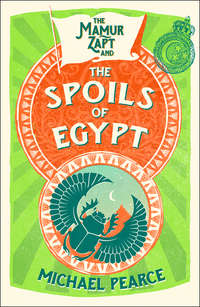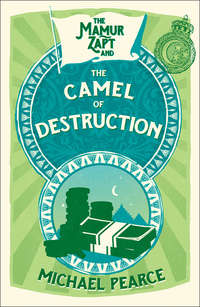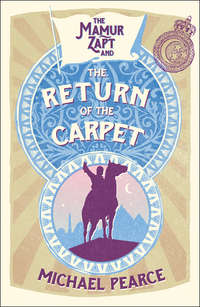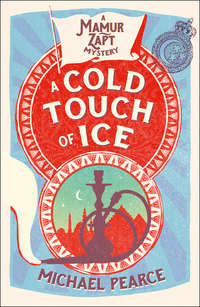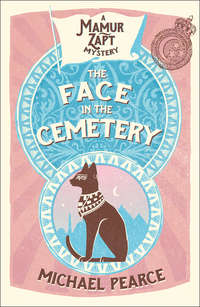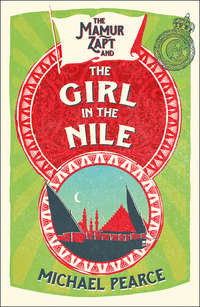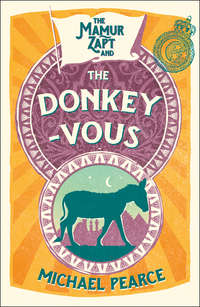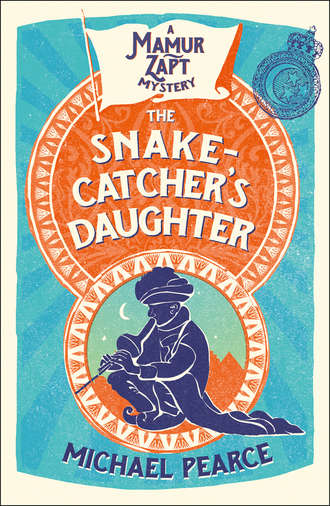
Полная версия
The Snake-Catcher’s Daughter
‘Can you take him?’
Owen grabbed hold of him. Selim, bold, reached over and caught up McPhee’s legs.
They lifted him down to the ground.
Something moved under his shirt. A snake put its head out. The girl plucked it out and threw it nonchalantly into the cistern.
‘It’s the warmth,’ she said. ‘They like to go where it’s warm.’
‘Warm?’ said Owen, and dropped on his knees.
McPhee was still alive. Alive, but very unconscious. Owen tipped his head back and looked at his eyes.
The girl knelt down beside him.
‘He’s overdone it, if you ask me,’ she said. ‘Taken a bit too much this time.’
‘Someone else gave it him,’ said Owen harshly.
He tore open McPhee’s shirt and put an ear to his chest. A strong, snaky smell, a mixture of snake and palm oil and spices, clung to the shirt. The girl caught it, too, and looked puzzled.
The heartbeat was slow but regular. Owen looked around. The tiny yard was packed to overflowing. He was suddenly conscious of the extreme heat and lack of air.
‘We must get the Bimbashi to the hospital,’ he said.
There were no arabeahs in that part of the city so the constables improvised a litter out of some of the planks lying against the wall. They had just pushed their way out into the street when the owner came rushing after them.
‘Hey!’ he said. ‘What are you doing? You can’t take those!’
‘Mean bastard!’ said the crowd indignantly.
The owner stepped back and hurriedly changed tack.
‘It’s not seemly,’ he said. ‘He’s a Bimbashi, after all!’
This was an argument which weighed with the crowd. And with the constables, who stopped uncertainly and lowered the litter to the ground.
‘Come on,’ said Owen, ‘we’ve got to get a move on.’
The crowd, however, now grown to even larger proportions, would not be moved. A lively debate ensued, the outcome of which was that an angareeb, the universal bed, was produced and McPhee laid gently upon it. The whole crowd then accompanied them to the hospital, which Owen could have done without.
‘But what was he doing there?’ asked Garvin.
‘I’ll ask him when he wakes up,’ said Owen.
McPhee, having awoken, did not respond at once. He seemed to be thinking about it.
‘I don’t think I can say, old man,’ he said at last, rather stuffily, ‘I really don’t think I can say.’
2
‘Can’t say?’ said Garvin in a fury. ‘Get him here!’
McPhee insisted on standing to attention. This irked Owen because he did not know how to do it properly. He had been, such were the ways of the British Administration, a schoolmaster before being translated into a senior post in the police. Owen had been in the army in India before coming to Egypt and while this was something he now tried to forget, it still irritated him mildly to see what looked like a parody of military drill. McPhee, however, was determined to take his medicine like a man.
‘I would prefer, sir, to regard the matter as closed,’ he said pompously.
‘Closed?’ said Garvin, affecting to fall back in his chair with astonishment. ‘Found drugged up to the eyeballs? Regards the matter as closed?’
‘I accept that I am to blame, sir. I take full responsibility.’
‘You mean you took the drug knowingly?’
McPhee was a great stickler for the truth.
‘I wouldn’t go so far as to say that, sir,’ he said uncomfortably.
‘Then what do you mean, you take responsibility?’
‘I shouldn’t have put myself in the position, sir,’ said McPhee, hot and bothered.
‘What position?’
‘I – I’d rather not say, sir.’
Garvin sighed.
‘McPhee,’ he said, ‘you are the Deputy Commandant of Police. You are found in a backyard heavily drugged. Does it not occur to you that some might regard this as anomalous?’
‘It was in off-duty hours, sir.’
‘You were doing this as a recreation?’
‘Yes, sir.’
‘Taking the drug?’
‘No, no, no, no, sir.’
‘Then?’
‘I don’t think they meant any harm, sir.’
‘Enough to knock you out for thirty-six hours? No harm?’
‘I think it was just that they didn’t want me to see anything.’
‘McPhee,’ said Garvin dangerously, ‘what was it exactly that you were doing?’
McPhee was silent.
‘You can tell us about it, old chap,’ said Owen, trying to be helpful. ‘We understand about such things.’
‘What things?’ said Garvin.
‘Bad women,’ prompted Owen gently.
‘Bad women?’ said Garvin incredulously.
‘Bad women?’ said McPhee, looking puzzled.
‘Sorry!’ said Owen. ‘It was just that I thought –’
‘Really, Owen!’ said McPhee in tones of disgust.
‘You’re obsessed, Owen,’ said Garvin. ‘Keep out of it. McPhee, what were you doing there?’
‘I was attending a Zzarr, sir,’ said McPhee bravely.
‘A Zzarr!’
‘In my own time. Off duty.’
‘I should bloody hope so,’ said Garvin.
‘What is a Zzarr?’ asked Owen.
‘A casting out of devils. From a woman.’
‘They’re held in secret,’ said McPhee. ‘You don’t come across them very often.’
‘Especially if you’re a man,’ said Garvin. ‘Did you say you were attending one?’
‘Yes, sir.’
‘I thought no men were allowed?’
‘They’re not, sir. Usually.’
‘Then how did you come to be there?’
‘I – I invited myself, sir.’
‘Using your position as Deputy Commandant?’
‘Yes, sir. I’m afraid so, sir.’
‘Why?’
‘Just interest. Curiosity, sir. You see, sir, they happen so rarely. At least, one comes across them so rarely. Little is known about them. There’s nothing about them in Lane, for instance. So –’
‘You thought you would add to the world’s knowledge?’
‘Yes, sir. In a way.’
‘Deputy Commandant!’ said Garvin disgustedly. ‘Casting out devils!’
‘My interest was purely scientific, sir,’ said McPhee stiffly.
‘Oh yes. I dare say.’
McPhee’s enthusiasm for traditional Egyptian ceremonies and rituals, the deeper mysteries, as he called them, was well known.
‘Did it occur to you,’ asked Garvin bitterly, ‘that your presence there might become known? Would, in fact, certainly become known by just about everyone in Cairo? Blazoned abroad in every newspaper?’
‘No, sir,’ said McPhee, hanging his head.
‘Listen,’ said Garvin: ‘how many British officers are there in the police, all told?’
‘Two, sir. Not counting Owen.’
‘Just you and me. Controlling a city the size of Cairo. How do we do it?’
‘Well, sir,’ said McPhee, slightly puzzled, ‘we can call on our men. Good men, sir, fine chaps … the army …’
‘Bluff!’ said Garvin emphatically. ‘We run the country by bluff. If somebody called our bluff we wouldn’t last five minutes. We survive,’ said Garvin, ‘only by means of credibility. Credibility! How much bloody credibility do you think we’ll have left when it gets about that we spend our time casting out devils?’
‘It was off duty,’ said Owen.
‘Thank you, Owen. You’re quite right. I have to speak precisely when there are lawyers, of the barrack-room sort, around. That we spend our spare time casting out devils.’
‘It won’t happen again,’ said McPhee.
‘I’m not sure I can afford the chance of it happening again.’
‘No, sir,’ said McPhee. ‘I understand, sir.’
‘I can’t afford my Deputy Commandant behaving like a bloody fool,’ said Garvin. ‘I can’t even afford him looking like a bloody fool.’
‘No, sir.’
‘I don’t think you’re being entirely fair,’ protested Owen. ‘McPhee has been the victim of an assault. It’s hardly his fault.’
‘Well, in a way, you know, I’m afraid it is,’ said McPhee, honest to a fault. ‘I shouldn’t have been there.’
‘How did you come to be drugged?’
‘They gave me a drink.’
‘And you drank it?’
‘I thought it was hospitality,’ muttered McPhee.
Garvin groaned.
‘The principal reason for sacking you,’ he said, ‘is that you are so damned stupid.’
‘I thought it was part of the ceremony,’ said McPhee. ‘Other people were drinking, too,’ he said defiantly.
‘They put something in when it got to you,’ said Garvin dismissively.
‘I would vouch for their honesty,’ said McPhee.
‘That confirms,’ said Garvin, ‘my view of your judgement.’
‘McPhee’s only just got out of sickbay,’ said Owen.
McPhee was, in fact, looking distinctly wan. Garvin let Owen lead him away. He took him out to the front of the building and found an arabeah, one of the small, horse-drawn carriages that were common in Cairo. He told one of the orderlies to get in with him and see he got safely home to bed.
When he got back to his office, Nikos said: ‘Garvin wants to see you.’
‘He’s just seen me.’
‘He wants to see you again.’
‘McPhee’s not well,’ he said to Garvin.
‘It was a big dose,’ said Garvin. ‘It must have been, for him to be out that long.’
‘It could have killed him.’
‘Yes,’ said Garvin, ‘and that’s another reason not to regard the incident as closed.’
Owen shrugged.
‘Is it sensible to carry it any further? Wouldn’t it be better to leave it alone and hope everyone forgets it?’
‘McPhee’s been the victim of an assault,’ Garvin pointed out. ‘You said that yourself.’
‘Well … all right, then. Perhaps someone ought to look into it.’
‘Fine!’ said Garvin. ‘Tell me how you get on.’
‘Hey! You’re not asking me to do it, are you?’
‘You surely don’t expect McPhee to investigate himself?’
‘It’s not political.’
The Mamur Zapt concerned himself only with the political. He was the equivalent of what back in England would be head of the political branch of the CID. He was, however, also much more. The Mamur Zapt had traditionally – for many centuries, indeed – been the ruler’s right-hand man, the chief of his secret police, the means by which he maintained himself in power. If he was so lucky. Caliphs came, Khedives went, but the Mamur Zapt went on forever.
Even when the British had come, thirty years before, the Khedive had insisted on retaining the post. Without it, he felt nervous. The British had agreed, insisting only that they nominate the occupant of the post. That, of course, had slightly changed matters. Formally, the Mamur Zapt, with his control of Cairo’s vast network of informers, spies and underground agents, was still responsible to the Khedive. In actual fact, he was responsible to the Head of the British Administration, the British Consul-General.
If, that is, he was responsible to anybody, which Consul-General, Khedive, Khedive’s Ministers, Opposition Members, Nationalists, British Government, Commander-in-Chief (British) of the army (Egyptian) and Garvin sometimes felt inclined to doubt.
All crime other than political was the responsibility not of the police, under the French-style system of law which operated in Egypt, but of the Department of Prosecutions of the Ministry of Justice, the Parquet, as it was known.
‘You’re not suggesting the Parquet handle this?’ said Garvin, aghast. ‘Investigating a British officer? A member of the Administration? Oh dear, no!’ He shook his head. ‘I don’t think we could have that. It would set an undesirable precedent. The C-G wouldn’t like it. The people at home wouldn’t like it. Goodness me, no. They wouldn’t like it at all.’
‘We are not investigating McPhee, surely!’ Owen protested.
‘Well, perhaps not directly,’ Garvin admitted. ‘It’s more the circumstances.’
‘I don’t call that political.’
Garvin raised his eyebrows.
‘Setting up a member of the British Administration? Not political? If that’s not political,’ said Garvin, ‘what is?’
‘No, really, Owen, he’s determined to get rid of me!’ said McPhee heatedly. ‘He’s been out to get me ever since they transferred him from Alexandria. I was in charge when he arrived, just temporarily, of course, and he didn’t like the way I was doing things.’
‘Well –’
McPhee held up his hand.
‘I know what you’re going to say. Perhaps we weren’t the most efficient of outfits. But is that so bad, Owen, is it really so bad? People knew where they were. They knew what to expect. A way that is traditional, Owen, is a way that is invested with a lot of human experience. You discard it at your peril.’
‘True. On the other hand –’
‘I know what you are going to say. Not all tradition is good. The courbash, for instance.’
‘Well, yes.’
The courbash was the traditional Egyptian whip. One of the first acts of the British Administration had been to abolish flogging.
‘Well, of course, I’m not against abolishing the use of the courbash. It was a humane measure carried out for humane motives. But not all reform is like that. Sometimes it’s carried out for piffling, mean little reasons. To improve efficiency, for instance. I ask you, where would we be if everything we did was subjected to that criterion?’
Not here, thought Owen. Neither you nor, probably, I.
‘It’s so mean-spirited. He looks around at the richness of life and then talks about efficiency!’
‘He’s got to run a police force, after all.’
‘But why doesn’t he run it in a way people want?’
‘What do they want?’
‘Humanity,’ said McPhee, ‘not efficiency.’
‘I dare say. Look, I don’t think he’s particularly out to get you. In fact, it’s the other way round. He thinks somebody is trying to set you up and he wants to stop them.’
‘Who on earth would want to set me up? Garvin apart, that is.’
‘You’re a senior figure in the police. Lots of people. People you’ve arrested.’
‘They don’t blame me. The common criminal is a decent chap.’
Owen sighed.
‘In Cairo, at any rate,’ said McPhee defensively. ‘Anyway, he doesn’t blame me, he blames fate.’
‘You don’t think he might personalize fate a little?’
‘No one’s out to set me up,’ said McPhee firmly. ‘It’s just another of Garvin’s fantasies.’
‘Some things do need explaining, though. How you finished up in the snake pit, for instance.’
‘I don’t think that was anything to do with the witch,’ said McPhee.
‘Witch?’
Oh dear, thought Owen.
‘Osman told me,’ said McPhee.
‘That there was going to be a Zzarr?’
‘Yes.’
‘And he invited you to it?’
‘No, no. Quite the reverse. He didn’t want me to come. In fact, he was most unwilling to talk about it.’
‘But he did?’
‘I prised it out of him. He had come, you see, to ask me for time off. To prepare for a ceremony, he said. Well, naturally, I asked what sort of ceremony. To do with a female cousin, he said. A circumcision, I asked? At first he said yes, but then it transpired the girl was twenty so I knew he couldn’t be telling the truth. In the end I got him to confess. It was a Zzarr. His sister was suffering from a mild case of possession. At least, that’s what they thought. A Zzarr, I said! My goodness me!’ He looked at Owen. ‘They’re immensely rare, you know. I’ve heard of them before and, indeed, once I nearly came upon one. So when I heard about this one I was tremendously excited and demanded that he tell me where it was being held.’
I’ll have a word with Osman, Owen said to himself.
‘It was in one of those houses on the edge of the Gamaliya, a big old house with both an outer courtyard and an inner one.’
‘Could you show it me?’
‘Well, I suppose I could. But I’d rather not. They placed me on my honour, you see –’
‘They also drugged you.’
‘Well … I’m not sure they did. Someone did, certainly. But not them. I was there on a basis of trust. Which was mutual.’
‘You made a bargain with them?’
McPhee hesitated.
‘Well, not initially.’ He looked uncomfortable. ‘There was, I’m afraid, an element of deception. On my part. I told them, you see, that it was a police raid. I pretended to have men with me. I demanded to see what was happening. They said it was out of the question. Very well then, I said, I will have to call my men. There was a bit of humming and ha-ing but eventually they said I could take a look through a window. I did and, my goodness me, Owen, it was fascinating! A ring of women, robes, candles, dancing –’
‘And then?’ Owen prompted.
‘Then all the candles went out. There was a great hubbub and lots of people came jostling me and told me I had to leave. And then the priestess came out –’
‘Priestess?’
‘Aalima. The witch. Well, I call her a priestess because, really, it was all most religious. It does have a religious basis, you know, Owen, there were religious sheikhs there, not in the Zzarr itself, of course, but in the courtyard outside –’
‘The Aalima?’ prompted Owen.
‘A most striking lady, Owen, most striking. Well, at first she absolutely refused. Said it was completely out of the question. And then I said that in that case I would have to arrest them.’
‘On what grounds?’
‘Causing a disturbance. The sheikhs didn’t like that, I can tell you.’
‘The sheikhs? You threatened to arrest the sheikhs?’
Oh Christ, thought Owen.
‘It was a bluff. And then I cunningly said that all I wanted to do was make sure that nothing untoward was happening, so I would be quite satisfied if they just brought me a chair and let me watch for a bit and satisfy myself on that score. In the end they agreed, provided I just listened – the music was marvellous, Owen, cymbals, you know, dubertas, timbrels. I agreed, of course, but then –’
He looked shamefaced.
‘I peeped.’
‘You did?’
‘Yes, I’m afraid I did. And, you know, Owen, it was most interesting, for what I saw –’
‘How did you come to get drugged?’
‘They brought me drink. They brought everyone in the courtyard drink. It was part of it, you see –’
‘Who brought you drink?’
‘A most charming girl. Dressed in white virginal robes –’
‘Yes, yes. Was she part of the, well, witch’s entourage?’
‘Yes. She came out with the bowl and took it round.’
‘She gave everyone a drink?’
‘Yes. Which is why, Owen,’ McPhee said with emphasis, ‘the drug must have been administered on a different occasion.’
‘Such as?’
‘Well, I can’t actually think –’ McPhee admitted.
‘Unless, of course, she put something special in just before she got to you.’
‘Oh, no, Owen. Really! A girl of integrity.’
Owen was beginning to see an argument for Gavin’s position.
‘And then you fell asleep?’ he said.
‘Yes. You know, Owen –’
‘Yes?’
‘I was very tired that night. You don’t think I could have just fallen asleep in the ordinary way and that afterwards someone administered –?’
‘While you were asleep? That strength? No,’ said Owen.
‘You see, I feel sure the lady was genuine.’
‘Well,’ said Owen soothingly, ‘perhaps, in her way, she was.’
McPhee looked pleased.
‘You think so? I must say, I’ve had doubts myself. Could it be a genuine survival, I’ve asked myself? Or –’
‘I shall want to know about the people in the courtyard,’ Owen said.
‘Hangers on,’ McPhee said, ‘excluded from the real mysteries.’
‘All men?’
‘Yes. They’re fascinated, too, of course. Can’t keep away. But frightened! The Aalima is a pretty compelling figure.’
‘Could you identify any of them?’
‘I might be able to recognize them. They’ll be local, of course.’
‘If you could just give me a start …’
McPhee nodded.
‘I’ll do my best. But, Owen,’ he said sternly, ‘there must be no messing about with the ladies. The Zzarr is a remarkable institution. It is, I am sure, pre-Islamic. I wouldn’t be surprised if it owed something to the Greek mysteries. I thought I caught some Greek words. Some Roman influence, too, perhaps. After all –’
‘Yes?’
‘Bacchantium instar mulieres vidimus.’
‘Quite,’ said Owen.
‘I protest,’ said Sheikh Musa.
‘I quite agree,’ said Owen heartily, ‘and I join myself in your protest.’
‘Wait a minute,’ said the Sheikh, ‘you’re the man I’m protesting to.’
‘If the subject of your protest is what I think it is,’ said Owen, ‘the deplorable assault on the Bimbashi a couple of nights ago, then we are on common ground.’
‘It’s not the assault I’m bothered about,’ said the Sheikh. ‘It’s his presence there in the first place.
‘At the Zzarr?’
The Sheikh winced.
‘We don’t like to use that word. The ceremony, you know, is not entirely regular. It’s not something that’s, well, officially recognized. We know it goes on, of course. There are people who, not to put too fine a point on it, are drawn to such things. I dare say you know the kind of people I mean?’
Owen, thinking of McPhee, said he did.
‘I wouldn’t want to encourage them by letting them think they have my approval. So I would prefer, if you don’t mind, not to use the word. To do so would be to admit that I know about such things.’
‘Well, yes, but … then why are you here?’
‘I have come to lodge a formal protest at Bimbashi McPhee’s presence.’
‘At what?’
‘An unspecified event in the Gamaliya district.’
‘You can’t protest at his presence if you’re unable to say what he was present at!’
‘From my point of view,’ said the Sheikh, ‘the protest is the important thing, not the event.’
‘I see.’
‘There’s a lot of feeling in the Gamaliya about the incident.’
‘I see.’
‘Which might boil over.’
‘What do you expect me to do about it?’
The Sheikh looked surprised.
‘Nothing,’ he said. ‘I just wanted to lodge a protest, that was all.’
Owen understood. The Sheikh was anxious to guard his back in terms of relations with his flock.
He thought for a moment.
‘I don’t know that I can accept a formal protest,’ he said. ‘If there wasn’t an event, there can’t have been a presence at it.’
‘Oh!’
‘I don’t think I could offer an apology. Formal, that is. However, I might be willing to issue a general statement deploring recent events – unspecified, of course, – in the Gamaliya. Would that help?’
‘From my point of view, yes.’
‘And from my point of view? Would that be enough to head off trouble?’
‘I doubt it,’ said Sheikh Musa.
Owen felt like kicking McPhee’s backside.
Owen still had hopes it would all quietly fade away. The heat would surely dissuade potential troublemakers from causing a riot and by the time the hot spell was over, with luck they would have forgotten about it. As for Garvin and McPhee, Garvin would soon be departing on leave. He usually liked to return to his old haunts at Alexandria and go duck shooting. With luck, he would return in a less savage frame of mind. Perhaps McPhee, too, could be induced to take a break: go and look at some of the monasteries in Sinai, for example. In heat like this people tended to get things out of perspective.
He had better watch that this didn’t happen in his own case. Perhaps he should take a holiday, too? The trouble was that Zeinab would insist on going to Paris. She regarded everywhere else as boringly provincial. The Government, on the other hand, insisted that its employees take their leave locally. Perhaps, on second thoughts, it might be best not to take a holiday. Besides, if Garvin and McPhee were away, someone had to look after the shop.
However, he must certainly guard against getting things out of perspective. He ought to take it easy for a bit. Working on this theory, he stepped out of the office mid-morning and went to his favourite café, taking the next day’s newspapers or, at least, the Arabic, French and English ones with him. He could always pretend that it was work. One of the Mamur Zapt’s duties was control of the press, a necessary function (in the view of the British) in a city of more than a dozen religions, a score of nationalities, a hundred different ethnic flavours and over a thousand sects, half of which at any given time were at the throats of the other half. To this end, he received advance copies of all publications.


